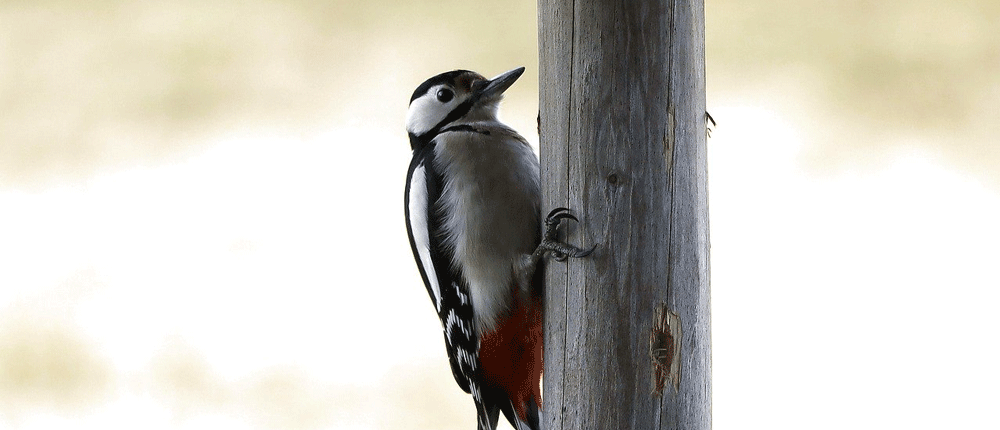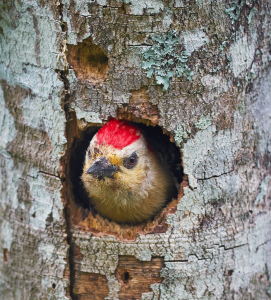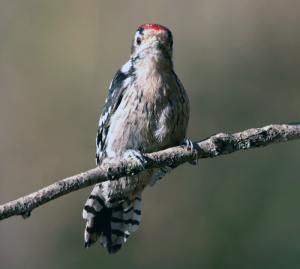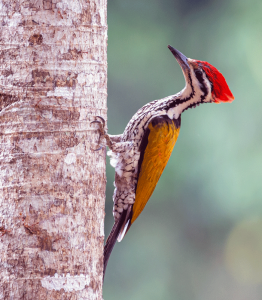How to get rid of Woodpeckers? (Humanely)
 There is no doubt that the woodpecker is a fascinating bird – they are a native species and, on balance, an asset to our environment.
There is no doubt that the woodpecker is a fascinating bird – they are a native species and, on balance, an asset to our environment.
The woodpecker is particularly well-known for its namesake – its remarkable ability to relentlessly peck at wood for food and communication. In its natural habitat, the pecking is not a problem. Still, when the bird begins to encroach on a house or the human environment, it creates several issues, including noise and property damage. This inconvenience is the main reason a person, or persons, may wish to remove a woodpecker from their property.
Here we will look at ways to identify if a woodpecker is damaging your property; and how to safely and humanely remove a woodpecker from a property, including underlying issues, prevention, and deterrents. To understand these techniques better, we will also look at the woodpeckers’ behaviors and why humane removal is an option.
Woodpecker Behavior – why do they peck and when?
Woodpeckers are, primarily, a forest-dwelling bird. They find their food and mates in this environment. As a result, they evolved a sharp, strong beak to peck the hardwood where they live for several reasons:
Finding a mate – woodpeckers will ‘drum’ rhythmically to attract a mate leading up to the mating season, around April and May.
Claiming territory – they will also drum to communicate to potential rivals that this is their territory.
Nesting – woodpeckers create nests by making holes in which to live in the pre-mating season around April and May. They may also excavate again for warmer nests in the fall.
Hunting food – they will peck into woods to find the insects they survive on, all year round.
A woodpecker may find a wooden home, buildings, telegraph poles, or other human-made structures enticing as a result of their behavioral traits.
How to Identify Woodpecker Damage
The first thing you should do is listen for the distinct, rhythmic drumming of the woodpecker.
An external inspection will reveal woodpecker damage: small holes mean food foraging, storage, or communication,large holes indicate nesting.
Why Humanely Remove them?
Humane removal is an option, and there are three main reasons for doing so.
Excessive property damage – a woodpecker will cause damage to a wooden structure if left unchecked. This damage can be costly, but also potentially cause structural issues – holes can weaken parts of a house, let the elements in or invite pests in.
Noise pollution – the woodpecker creates a loud noise that can be irritating, loud, and incessant, as they can peck up to 12,000 times a day.
Protected species – as a wild bird, it is a federal offense to kill a woodpecker without a permit. They are also beneficial to the ecosystem. Fortunately, there are many methods of humane removal.
How to humanely get rid of woodpeckers
There are many ways to remove woodpeckers from your property, and they range from prevention to deterrents to pest control methods. Most often, a combination of treatments is needed.
Prevention
Knowing when to expect woodpeckers can help when you are considering prevention as an effective treatment method. There is a good reason why there is the saying ‘prevention is better than cure – ‘ if you can prevent the problem, you will avoid any damage and costs in the future.
Here are some effective prevention
methods.
Exterminate pests like termites and ants – go for the food source. Your house may have an underlying infestation of a pest that woodpeckers like to eat, like termites. No food, no woodpecker.
Shore up holes – ensuring any likely places a woodpecker might get to are fixed up will help. Use wood putty as a suggestion.
Hardware cloth/bird netting – cladding affected areas will keep the woodpeckers out. The downside is this may look a bit unsightly on your home.
Remove dead trees – taking out dead trees close to your property will prevent animals from gathering that woodpeckers traditionally like to eat, i.e. bugs and insects.
Bird spikes – placing these on the house or property will prevent perching places for woodpeckers and other birds.
Deterrents
You may also want to combine some deterrent methods to scare off an existing woodpecker issue. Here are some suggestions.
Visual deterrents
Scarecrows – it’s a tried and tested method and works to scare birds away. Fake predatory bird statues – again, like the scarecrow, a bird cannot tell the difference
between a real predatory bird and a fake one.
Reflective tape/streamers – bright colored tape, silver reflective tape, and moving, flowing objects all combine to scare off woodpeckers, though, again, this may be
unsightly.
Lighter colors – studies have indicated, but are not proven, that lighter-colored siding or aluminum is less likely to be pecked.
Audible deterrents
Ultrasonic sound devices – specialized high frequency-emitting sound devices will deter birds, who can pick up the noises a human ear cannot.
Animal call sounds – perhaps a little less practical if neighbors surround you, but predatory animal call soundtracks can act as a deterrent.
Pest control
Chemical repellent – there are certain paints you can purchase that are laced with a chemical that is unappealing to woodpeckers.
Professional service – a specialist may be better able to conduct a more strategic, time-saving, and cost-effective method than you might be able to achieve alone.
Alternative food sources/nesting homes
Creating a birdhouse may offer a pleasant distraction and an alternative home for a nesting woodpecker. You may also consider leaving food that woodpeckers enjoy close to, but away from your home or property you wish to protect – woodpeckers don’t just eat insects and bugs, but also nuts and seeds.
As mentioned at the beginning of this article, no one method will solve a woodpecker issue, or get rid of them, but a combination of techniques may help. If a persistent problem exists, you may need to consider contacting a professional to come and address getting rid of the woodpeckers. Also remember that unless you have a permit, it is a federal offense to kill woodpeckers, so please attempt to rid them humanely – they are of benefit to our ecosystem, even if they can be destructive and noisy.
HOW TO KEEP WOODPECKERS AWAY
 Woodpeckers are a fascinating species of bird and serve their place in the environment and ecosystem. Sometimes those woodpeckers become an issue when they see a beautiful wooden home or property and decide to nest or feed there. Woodpecker damage can be unsightly and costly, not to mention the irritating noise they make.
Woodpeckers are a fascinating species of bird and serve their place in the environment and ecosystem. Sometimes those woodpeckers become an issue when they see a beautiful wooden home or property and decide to nest or feed there. Woodpecker damage can be unsightly and costly, not to mention the irritating noise they make.
‘Prevention is better than cure’ so the saying goes. This saying holds when considering problem woodpeckers. Keeping woodpeckers away from your home or property, instead of getting rid of a problem woodpecker, will save you time, frustration, and money. Here we will address some methods you may want to consider employing if you are planning to tackle woodpeckers before they become an issue.
Pest Control
Woodpeckers are attracted to the food they like, including bugs and insects, as well as fruits and seeds. You may have an underlying infestation problem in your home and not even know it. Consider treating your house for pests regularly to avoid drawing the attention of hungry woodpeckers.
Noise Control
Keep woodpeckers away using specially-made ultra-high frequency sound emitting devices. These devices emit noise that is out of range of human hearing but will certainly deter those birds.
Animal soundtracks may also help to keep woodpeckers at bay, but this might be less desirable, especially to your neighbors.
Statues
Fake predatory bird statues, like owls, will also keep woodpeckers away – they cannot tell the difference between a real bird and a fake one.
Bird Spikes
Installing bird spikes on any bird-convenient ledges will prevent any woodpeckers (or any birds) from being able to make a landing on your house.
Tree Removal
Removing any dead trees around your property will remove areas for bugs and insects to live and take away tempting food sources for woodpeckers, who will hopefully lose interest in your place.
Netting
Netting – and hardware cloth – will ensure no woodpecker can even get near the wood on your home as it will not be able to get past the specialized netting.
Birdhouses and bird feed
Creating an alternative nesting arrangement and food source with seeds and nuts may be enticing enough to keep the woodpeckers away from your house.
Reflective streamers and tape
Woodpeckers do not like going near shiny and bright flowing objects – cladding your property with bright or reflective tape, and streamers will keep them away for sure.
Chemical treatment
Some specialist paints come laced with a chemical that is a deterrent to woodpeckers – it has a taste that is unpleasant to them. Coating your home, or problem areas of your property, with this chemical will ensure woodpeckers do not peck anywhere near you.
Using a combination of these methods -or all of them – will hopefully ensure that you do not need to address removing problem woodpeckers because you have been successfully able to keep them all away. As previously mentioned, once a woodpecker decides to nest or forage for food on your house, it can cause significant damage and will cost a lot to repair. By investing some money for prevention, you'll save money – and time- in the longer run.
How to Kill Woodpeckers
 Sometimes, despite the best attempts to deter or prevent woodpeckers from pecking a home or property, they continue to persist. In these instances, it may become necessary to take a lethal approach to remove a problem woodpecker or woodpeckers. We will discuss the lethal methods that may be effective against woodpeckers and the relevant regulations that require attention.
Sometimes, despite the best attempts to deter or prevent woodpeckers from pecking a home or property, they continue to persist. In these instances, it may become necessary to take a lethal approach to remove a problem woodpecker or woodpeckers. We will discuss the lethal methods that may be effective against woodpeckers and the relevant regulations that require attention.
Regulations
Woodpeckers are a protected species under the Migratory Bird Treaty Act of 1918. The law states, “No person may take (kill), harass, possess, import, export, transport, sell, purchase, barter, or offer for sale, any migratory bird, or the parts, nests, or eggs of such bird except as may be permitted under the terms of a valid permit…”
It is imperative to note that it is illegal to kill a woodpecker unless the relevant permit is attained. The U.S. Fish & Wildlife Service is the agency responsible for handing out permits – an application must be submitted for Migratory Bid Depredation.
Alternatively, hiring a licensed professional service is also a good option.
Permits are scarce and difficult to obtain. It is also challenging to find a licensed professional who would turn to lethal methods anyway, so it is again strongly advisable to keep lethal methods as a last resort when addressing a problem woodpecker. If absolutely necessary, it is worth keeping detailed notes on the steps taken to remove or scare away woodpeckers with no results.
Please look at techniques for safe and humane woodpecker removal and how to keep them away in the first instance – these can be easy, cost-effective, and work most of the time.
Methods
In failing to deter woodpeckers, turning to these lethal methods will obtain the best results.
Shooting – shooting is an effective way to kill the woodpecker. They are a small bird, so it does not require much – one clean shot. Always ensure you check the law regarding firearms in your state, and remember that you need a special permit!
Poison – poisoning the nest or food of a woodpecker will remove it from the house or property. Cholecalciferol or Strychnine may be effective poisons to kill a woodpecker.
Always be cautious using poisons as you may inadvertently poison other wildlife in the process of destroying the woodpecker.
Trapping – luring and trapping is another effective method. A simple structure like a birdhouse with a one-way entry can hold the bird for later destruction, or you can install a snap trap within the enclosure to kill it.
These are the most effective methods for woodpecker removal by lethal means. So, in summary:
Always aim for prevention first to avoid any damage in the first instance. If prevention fails, take several non-lethal methods to remove the woodpecker from your property.
If problems still persist, contact a professional to discuss safe and humane removal. If all the above fail, you may decide to consider applying for a permit to use lethal force on the woodpecker or woodpeckers. Remember, until you have a permit, it is a federal offense to kill a woodpecker, so be careful!
